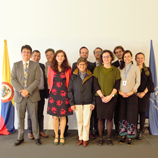
Interview with Angela Me, Chief of the Research and Trend Analysis Branch at the United Nations Office on Drugs and Crime (UNODC) on her visit to the UNODC Country Office in Colombia
What are the key findings from your visit to Colombia?
Colombia faces several unique and interlinked challenges. Protecting its vast nature and biodiversity is a huge task in itself, made even more difficult by organized crime groups seeking to expand their activities. Coca cultivation in the country poses a challenge to preserving biodiversity, providing security, maintaining the rule of law and investing in rural communities. UNODC helps address these issues, among other things by acting as an honest broker that can support coordination between various actors in the Colombian government and society. It is essential that we keep our long-term engagement to build sustainable solutions.
Did you identify new opportunities?
The strong and cooperative relationship that UNODC has with the Colombian government is a great opportunity, as are the excellent tools that the office has developed. I was impressed by the sophisticated geospatial analysis and dissemination system of the Integrated Illicit Crop Monitoring System, knowledge of which I will take back to Vienna.
What would you say to the international community to encourage further support to Colombia?
When it comes to neighboring countries, I would highlight that they stand to benefit from UNODC's successes in Colombia. As for other donors, it is important to explain the link between drugs, crime and development, and highlight how supporting activities against illicit drugs and crime ultimately further development.
What are the next steps for you back in Vienna?
We have defined a roadmap on how we can collaborate with the Integrated Illicit Crop Monitoring System to integrate the work carried out in Vienna and Colombia. We can benefit from each other's tools and knowledge. We also see the possibility to have the office in Colombia supporting other countries in the region.
Which countries could benefit most from the experience in Colombia?
In the first place its neighboring countries. The government's knowledge on the processing of cocaine and on the actors involved is unique. Its neighbors can learn a lot from this, while of course considering country-specific differences. Countries in the region and beyond can also benefit from its expertise in crop monitoring and in countering Illicit mining.
In terms of technology, what is the next step?
In terms of data collection it's big data. We currently collect information directly from the source, which is costly. Big data means looking at the information already available and bringing this together in a meaningful way. The next step in technology is artificial intelligence (AI). For example, if you want to collect information on drug seizures, you can have AI systems review and bring together all relevant media reports. It's important to keep an eye on the quality of information though. The benefit of big data and AI is that you can explore a vast number of things cheaply without having to be on-site. The disadvantage is that you cannot completely trust the quality of the information.
If you could see UNODC in ten years from now, how would it ideally work?
It would have more automated systems in terms of data collection and interpretation, paired with specific studies as quality control. We currently use global questionnaires to collect data from member States, I don't think we will have these in 20 years, but all information will be gathered online.
How can we collect data from rural communities not frequently connected to the web?
One way is by remote sensing. For example, you see a light, so you know where people live; you look at the intensity of the light, so you know when they are there and when they are not. You can see if they have a school or not, what they cultivate, etc. You can also understand a lot by using data from mobile phones.
As Director of Research at UNODC, Angela Me is in charge of the collection, analysis and dissemination of drug and crime statistics, as well as of the development of international standards in the research field. But Ms. Me also has an important responsibility supporting Member States in their efforts to collect drug and crime data to design and implement effective public policy. During her visit to Colombia in March 2019 UNODC Colombia talked to her about the challenges and opportunities that the country has in terms of research and the impact on the region.